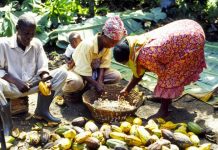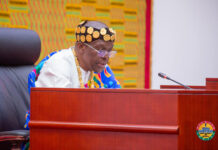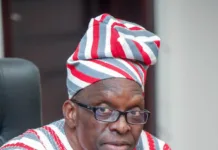
During the 72nd United Nations General Assemby meeting, recently held in New York, the President of the United States of America, Donald Trump, held a meeting with eight African leaders, including President Nana Addo Dankwa Akufo-Addo, where he acknowledged the tremendous potential of the continent for the development of their economies, and added that his policy for Africa was to promote trade and investment.
President Nana Akufo-Addo, in an exclusive interview with the Daily Statesman and a section of the media, yesterday, said he was enthused about the new policy direction announced by Mr Trump, explaining that it would go a long way to erase the culture of aid and dependency which had not served African countries well over the years.
“The policy that emerged from our discussion was that he recognized the tremendous potential of Africa for the development of our economies, and his attitude was that the United States should be very engaged in promoting trade and investment in Africa. And we are shifting away from the aid mentality and culture. He was talking about American companies investing in Africa and African companies doing same there. That was his attitude,” the president explained.
He added: “I welcome it because, I, myself, feel that the aid culture and dependency has not served us particularly well, and it is time for us to move away from it. So it was good to see that, here, an American President is saying that, now American policy is pivoted from focus on aid to focus on trade and investment. I think that was the important thing, because at the end of the day, it is the most sustainable basis for long term economic engagement between countries, where you are talking about trade and investment and not aid. So I welcome that very much.”
President Nana Akufo-Addo said Ghana was going to see to what extent the new set of programmes that the American government would “put out in the weeks, months and years ahead” would reflect this new focus of President Trump.
“We will see through the programme and initiative they are going to put out, and we are ready on our part to participate and partner the United States, especially if the focus of the American policy is trade and investment,” the president added.
According to President Nana Akufo-Addo, he was also re-assured by the emphasis of President Trump on democracy, “as the vehicle for promoting human happiness, respect for freedoms and respect for the rule of law.”
He added: “And that emphasis is one that accords very much with what we have been trying in the period of the Fourth Republic to do here in Ghana. So that was also re-assuring.”
Ghana has enjoyed strong bond of friendship with the US in recognition of the same values of democracy, rule of law, transparency and accountability in governance shared by the two countries.
One of the most outstanding dividends of that relationship is the Tetteh Quarshie Overpass-Mallam Junction road.
The project, which was begun by the New Patriotic Party government under former President Kufuor, was completed by the National Democratic Congress government under late President Mills.
Named George Walker Bush Highway, after former US President George Bush Junior, the road was constructed at an estimated cost of $173.2 million, and financed under the Millennium Challenge Account from which the US Government, during the reign of President Bush Junior, gave Ghana a total of $547 million for poverty reduction projects across the country.
According to President Nana Akufo-Addo, there can be no doubt about the continued relationship between Ghana and the US, “as much as we agree with the broad framework and the broad context of the macro policy.”
He added that even though Ghana was bound to have its differences with the US on immigration issues, “the manner in which President Trump went about his interaction with the eight African leaders he met suggests that there would be space to look at these differences in a constructive manner.”
According to the president, while Mr Trump showed at the meeting that he had little knowledge about the policies of many African countries, he indicated his preparedness to dialogue with their leaders, thus prompting some of them, especially the longest serving ones, to acknowledge that they had never had such intimate encounter with a sitting US President.
“So, eventually, I think most of those around the table left with a good impression,” he told the press, adding: “We are now in a position to engage each other; there is a framework of policy that we can look at and engage with.”
The President said even though he had been at the UN General Assembly for about six times as foreign minister, there was a vast difference when he went there this time as a President.
“I did not have a spare moment these six days I was in the US. Every morning people are there to see you all the time. I always wondered why this pack of people wanted to see me, and I enjoyed it very much,” he stated.
The president added that the opportunity to speak for the first time as president at the UN General Assembly “was something that was a big privilege for me and I enjoyed that also very much.”
He had previously taken part in Security Council proceedings of the UN, as the Chair, when he was the foreign minister of Ghana.
By Nana Yaw Dwamena/Daily Statesman




